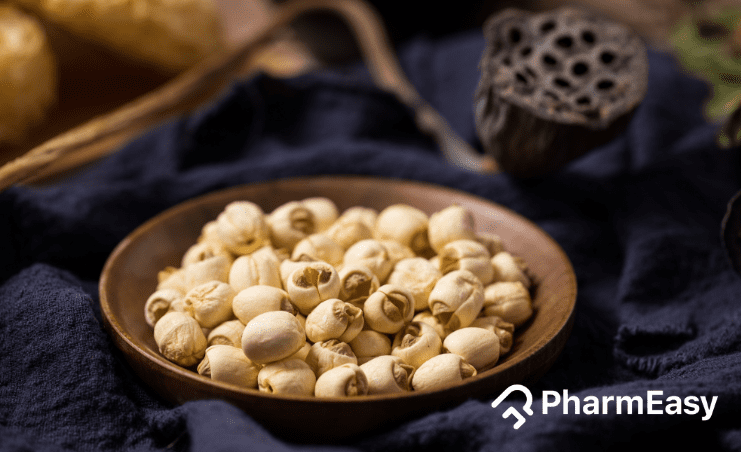Lotus Seed: Uses, Benefits, Side Effects and More By Dr. Smita Barode
By Dr Smita Barode +2 more

Get,

to manage your symptom
Get your,


4 Cr+ families
benefitted

OTP sent to 9988776655



You’ve successfully subscribed to receive
doctor-approved tips on
Whatsapp

Get ready to feel your best.

Hi There,
Download the PharmEasy App now!!


Register to Avail the Offer
Send OTPBy continuing, you agree with our Privacy Policy and Terms and Conditions

Hi There,
Sign up on PharmEasy now!!
Trusted by 4 crore+ families

OTP sent to 9988776655



You have unlocked 25% off on medicines




Code: NU25

Comments


Leave your comment here
By Dr Smita Barode +2 more
Table of Contents
Lotus seed is a quick snack to munch on while watching a movie. Lotus seed is also known as lotus nut or kamal seed. The scientific name of lotus seeds is Nelumbinis semen, derived from the lotus plant, Nelumba nucifera. It has been a functional food, medicine and vegetable for about 7000 years. There are two types of dried lotus seeds, one with white peel and the other with brown peel. Lotus seeds have been extensively produced and cultivated in India, Japan and China. Lotus food has been approved as food and medicine by ‘Ministry of Health of the People’s Republic of China’. Lotus seeds have fewer calories and are a host of nutrients; therefore, they play an essential part in the functions of the body1. Let us look at some of the health benefits of lotus seeds.
Did you know?

Lotus seeds may contain several bioactive compounds like alkaloids, glycosides, triterpenoids, flavonoids, polyphenols, polysaccharides, essential oils and many more. Below are the nutritional components of Lotus seeds:
Several studies have shown that lotus seed may have the following properties:
Beta-galactosidase, a compound found in lotus seeds, can break the lactose molecule of milk and make it lactose-free. From my experience, the combination of lotus seeds and milk may aid lactose-intolerant people7.
Dr. Siddharth Gupta, B.A.M.S, M.D (Ayu)
Some of the potential uses of lotus seed are:

Excess weight in the body is due to adipocytes (fat cells). A study1 by Achike et al. in 2011 showed that lotus seeds may inhibit the formation of fat cells and reduce the weight of the fat tissues. In addition, polyphenols found in lotus seeds may improve the lipid profile in the body. However, further studies are required to check if lotus seeds can help to manage weight. Therefore, you must consult your dietician before making any diet changes.
From my perspective, lotus seeds might be your ally in your weight loss journey. Studies9 suggest that the resistant starch from lotus seed has the potential to decrease the blood sugar level and hence may aid in managing weight.
Dr. Smita Barode, B.A.M.S, M.S.

Alzheimer’s disease is a neurodegenerative disorder which results in memory loss and other mental impairments. Lotus seeds may have neuro-protective effects i.e, it may protect the nerve cells from damage as in the case of Alzheimer’s disease. A study1 by Kim et al. in 2014 showed that proanthocyanidins in lotus seeds may reduce brain ageing and cognitive impairment. In addition, lotus seeds may reduce the risk of Alzheimer’s disease by decreasing the harmful free radicals and accumulation of unnecessary calcium. However, further studies are required to check if lotus seeds can be beneficial in improving the symptoms of Alzheimer’s disease. You must consult your doctor if you suspect any symptoms of Alzheimer’s disease.

A study1 by Sugimoto et al. in 2008 showed that bioactive compounds like saponins, flavonoids, alkaloids and tannins may help to reduce anxiety and depression. The alkaloids in lotus seeds may increase the time of sleep. Getting good sleep may help manage depression. However, these studies were conducted on mice. Further studies on humans are required to check if lotus seeds may be beneficial for anxiety and depression.

A study1 by Tang et al. in 2017 showed that lotus seeds may have anti-microbial properties. Lotus seeds may disrupt the structure and function of the plasma membrane. Additionally, lotus seeds may inhibit the growth of Salmonella sp., Staphylococcus aureus, Escherichia coli., Klebsiella sp., Shigella, and Pseudomonas sp. However, more studies are required to confirm if lotus seeds can be used for microbial infections. You must consult your doctor if you experience any microbial infection.

A study3 by Mani et al. in 2010 showed that lotus seed might be used in the case of type 1 and type 2 diabetes. Various minerals present in lotus seeds may be beneficial for diabetes. For example, zinc in lotus seeds reduces oxidative stress in type 1 diabetes patients and transports glucose to the cells in type 2 diabetes patients. Chromium may increase the number of insulin receptors and glucose metabolism, thereby decreasing blood glucose levels in type 2 diabetes patients. However, further studies are required to check if lotus seeds can help to reduce blood glucose levels. You must check your blood sugar levels regularly and consult your doctor in case of abnormal blood sugar levels.

A study4 by Poornima et al. in 2013 showed that lotus seeds might act against lung cancer. A bioactive compound, nepherine in lotus seed, may kill the cancer-causing cell (apoptosis) and inhibit their growth. However, further studies are required to check if lotus seeds may act against cancer. Therefore, you must consult your doctor if you suspect cancer instead of self-medicating.

A study5 by Chakravarthi et al. in 2009 showed that the flavonoids in the lotus seeds might help to relieve pain. Lotus seeds may inhibit the cyclooxygenase enzyme, which is responsible for releasing pain mediators. However, further studies are required to check if lotus seeds can help relieve pain. Therefore, you must consult your doctor if you experience prolonged pain.

A study6 by Rai et al. in 2006 showed that flavonoids in lotus seeds might be responsible for their antioxidant potential. The flavonoids may destabilize the harmful free radicals (molecules in the body) and reduce oxidative stress by removing the free radicals from the body. This would reduce the risk of several diseases like diabetes, heart disease, liver disease, etc1. However, more studies are required to check the antioxidant potential of lotus seeds.
Though studies show the benefits of lotus seed in various conditions, these are insufficient, and there is a need for further studies to establish the true extent of the benefits of lotus seed on human health.
You can consume lotus seeds in the following ways:
You must consult a qualified doctor before taking lotus seeds in large quantities or any herbal supplements. Likewise, do not discontinue or replace an ongoing modern medical treatment with an ayurvedic/herbal preparation without consulting a qualified doctor.
Lotus seeds are known as a rich source of a compound, phytosterol. I recently read an article suggesting regular consumption of lotus seeds as phytosterol helps to lower cholesterol levels. From my perspective, lotus seeds might be a saviour to help cope with heart diseases8.
Dr. Rajeev Singh, BAMS
Excessive consumption of lotus seed may cause the following side effects:
If you notice any allergic reaction to consuming lotus seed, seek immediate medical attention. First, consult your ayurvedic physician who has prescribed it to you; they will be able to identify the cause and treat it effectively.
Also Read: Fennel (Saunf) Seeds: Uses, Benefits, Side Effects, and more!
You must take the following precautions before consuming lotus seeds:
Consult your doctor before consuming lotus seeds if you have any pre-existing diseases.
Also Read: Flax seeds (Alsi): Research-Backed Health Benefits
Lotus seeds may interact with diabetic medicines like insulin. You must consult your doctor before you consume lotus seeds if you are on diabetic medicines.
Also Read: Lotus Stem: Uses, Benefits, Side Effects By Dr. Smita Barode
Lotus seeds may be used to relieve pain, manage weight and reduce blood sugar levels. It may be used to reduce depression and anxiety. Lotus seeds can be used for microbial infections, cancer and Alzheimer’s disease. Additionally, lotus seeds can be used to protect the liver1,6. You must consult your doctor if you suspect any of the mentioned conditions instead of self-medicating.
Yes, lotus seeds are used to manage weight. Lotus seeds may inhibit the formation of fat cells (adipocytes) and reduce the weight of the fat tissues1. However, you must consult your dietician before making any diet changes.
Lotus seeds may interact with diabetic medicines like insulin. You must consult your doctor before you consume lotus seeds if you are on diabetic medicines.
Lotus seeds can be consumed as cooked, uncooked, ripened or raw. Lotus seeds can be used as roasted or ground and boiled into syrups1. You must consult a qualified doctor before taking lotus seeds in large quantities. Do not discontinue or replace an ongoing treatment of modern medicine with an ayurvedic/herbal preparation without consulting a qualified doctor.
Excessive consumption of lotus seeds may cause side effects. If you are allergic to nuts and seeds, you may also be allergic to lotus seeds. Lotus seeds may cause constipation, flatulence and bloating. If you notice any allergic reaction to consuming lotus seed, seek immediate medical attention. First, consult your Ayurvedic physician who has prescribed it to you; they will be able to identify the cause and treat it effectively.
Disclaimer: The information provided here is for educational/awareness purposes only and is not intended to be a substitute for medical treatment by a healthcare professional and should not be relied upon to diagnose or treat any medical condition. The reader should consult a registered medical practitioner to determine the appropriateness of the information and before consuming any medication. PharmEasy does not provide any guarantee or warranty (express or implied) regarding the accuracy, adequacy, completeness, legality, reliability or usefulness of the information; and disclaims any liability arising thereof.
Links and product recommendations in the information provided here are advertisements of third-party products available on the website. PharmEasy does not make any representation on the accuracy or suitability of such products/services. Advertisements do not influence the editorial decisions or content. The information in this blog is subject to change without notice. The authors and administrators reserve the right to modify, add, or remove content without notification. It is your responsibility to review this disclaimer regularly for any changes.
Comments

Leave your comment...

View all comments(1)
You may also like
Does raw lotus seeds help increase breast size?